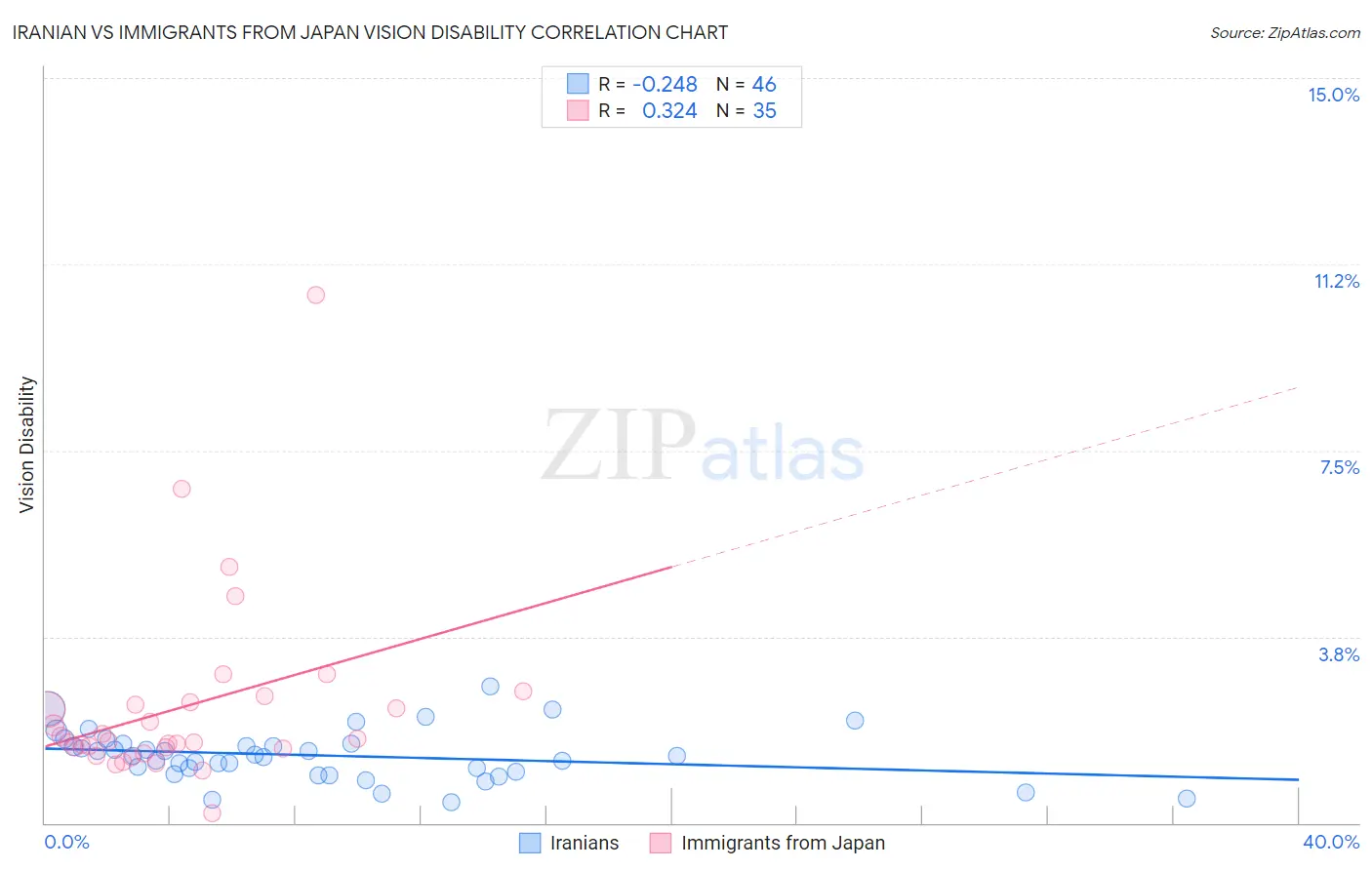Iranian vs Immigrants from Japan Vision Disability
COMPARE
Iranian
Immigrants from Japan
Vision Disability
Vision Disability Comparison
Iranians
Immigrants from Japan
1.8%
VISION DISABILITY
100.0/ 100
METRIC RATING
8th/ 347
METRIC RANK
1.9%
VISION DISABILITY
99.9/ 100
METRIC RATING
26th/ 347
METRIC RANK
Iranian vs Immigrants from Japan Vision Disability Correlation Chart
The statistical analysis conducted on geographies consisting of 316,677,046 people shows a weak negative correlation between the proportion of Iranians and percentage of population with vision disability in the United States with a correlation coefficient (R) of -0.248 and weighted average of 1.8%. Similarly, the statistical analysis conducted on geographies consisting of 339,950,646 people shows a mild positive correlation between the proportion of Immigrants from Japan and percentage of population with vision disability in the United States with a correlation coefficient (R) of 0.324 and weighted average of 1.9%, a difference of 7.4%.

Vision Disability Correlation Summary
| Measurement | Iranian | Immigrants from Japan |
| Minimum | 0.41% | 0.20% |
| Maximum | 2.8% | 10.6% |
| Range | 2.3% | 10.4% |
| Mean | 1.4% | 2.3% |
| Median | 1.4% | 1.6% |
| Interquartile 25% (IQ1) | 1.0% | 1.5% |
| Interquartile 75% (IQ3) | 1.6% | 2.4% |
| Interquartile Range (IQR) | 0.57% | 0.92% |
| Standard Deviation (Sample) | 0.51% | 1.9% |
| Standard Deviation (Population) | 0.50% | 1.9% |
Demographics Similar to Iranians and Immigrants from Japan by Vision Disability
In terms of vision disability, the demographic groups most similar to Iranians are Immigrants from South Central Asia (1.8%, a difference of 0.15%), Immigrants from Singapore (1.8%, a difference of 0.74%), Immigrants from Hong Kong (1.8%, a difference of 0.93%), Immigrants from Israel (1.8%, a difference of 2.1%), and Immigrants from Korea (1.8%, a difference of 2.3%). Similarly, the demographic groups most similar to Immigrants from Japan are Bulgarian (1.9%, a difference of 0.040%), Immigrants from Lithuania (1.9%, a difference of 0.080%), Immigrants from Asia (1.9%, a difference of 0.20%), Taiwanese (1.9%, a difference of 0.34%), and Immigrants from Pakistan (1.9%, a difference of 0.74%).
| Demographics | Rating | Rank | Vision Disability |
| Immigrants | South Central Asia | 100.0 /100 | #7 | Exceptional 1.8% |
| Iranians | 100.0 /100 | #8 | Exceptional 1.8% |
| Immigrants | Singapore | 100.0 /100 | #9 | Exceptional 1.8% |
| Immigrants | Hong Kong | 100.0 /100 | #10 | Exceptional 1.8% |
| Immigrants | Israel | 100.0 /100 | #11 | Exceptional 1.8% |
| Immigrants | Korea | 100.0 /100 | #12 | Exceptional 1.8% |
| Immigrants | Eastern Asia | 100.0 /100 | #13 | Exceptional 1.8% |
| Immigrants | China | 100.0 /100 | #14 | Exceptional 1.8% |
| Immigrants | Bolivia | 100.0 /100 | #15 | Exceptional 1.8% |
| Indians (Asian) | 100.0 /100 | #16 | Exceptional 1.8% |
| Burmese | 100.0 /100 | #17 | Exceptional 1.8% |
| Bolivians | 100.0 /100 | #18 | Exceptional 1.9% |
| Immigrants | Sri Lanka | 100.0 /100 | #19 | Exceptional 1.9% |
| Asians | 100.0 /100 | #20 | Exceptional 1.9% |
| Turks | 100.0 /100 | #21 | Exceptional 1.9% |
| Immigrants | Pakistan | 100.0 /100 | #22 | Exceptional 1.9% |
| Immigrants | Asia | 99.9 /100 | #23 | Exceptional 1.9% |
| Immigrants | Lithuania | 99.9 /100 | #24 | Exceptional 1.9% |
| Bulgarians | 99.9 /100 | #25 | Exceptional 1.9% |
| Immigrants | Japan | 99.9 /100 | #26 | Exceptional 1.9% |
| Taiwanese | 99.9 /100 | #27 | Exceptional 1.9% |